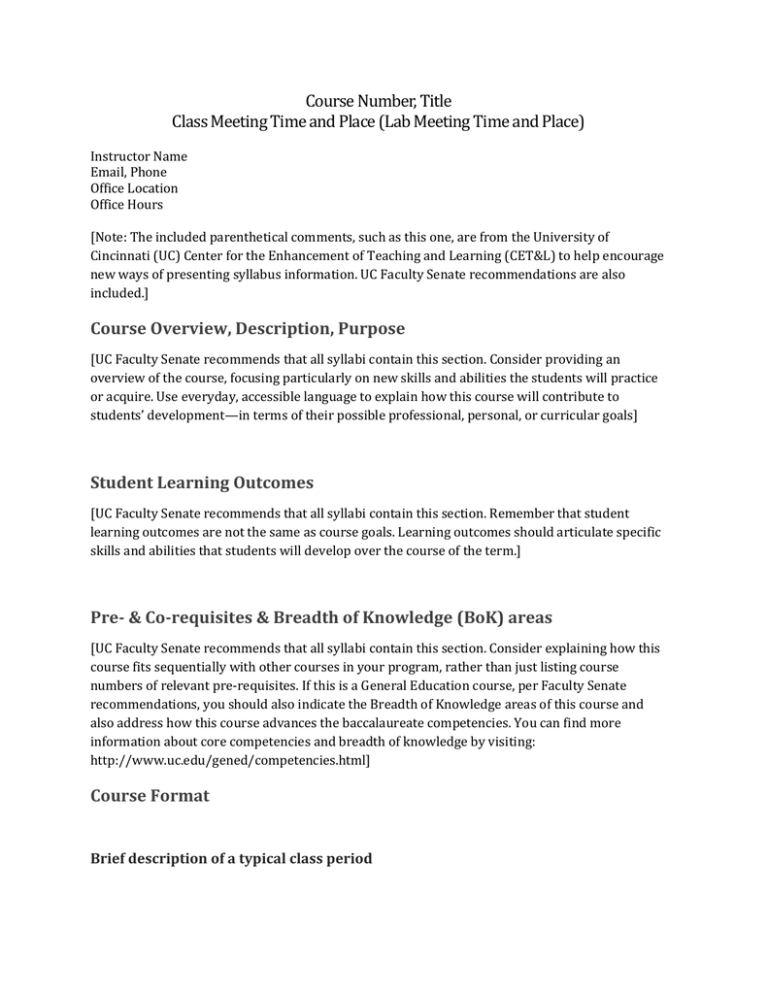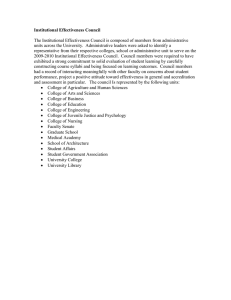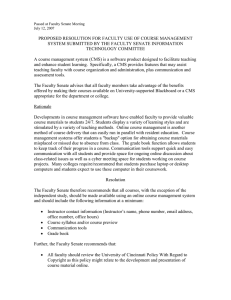Course Number, Title
advertisement

Course Number, Title Class Meeting Time and Place (Lab Meeting Time and Place) Instructor Name Email, Phone Office Location Office Hours [Note: The included parenthetical comments, such as this one, are from the University of Cincinnati (UC) Center for the Enhancement of Teaching and Learning (CET&L) to help encourage new ways of presenting syllabus information. UC Faculty Senate recommendations are also included.] Course Overview, Description, Purpose [UC Faculty Senate recommends that all syllabi contain this section. Consider providing an overview of the course, focusing particularly on new skills and abilities the students will practice or acquire. Use everyday, accessible language to explain how this course will contribute to students’ development—in terms of their possible professional, personal, or curricular goals] Student Learning Outcomes [UC Faculty Senate recommends that all syllabi contain this section. Remember that student learning outcomes are not the same as course goals. Learning outcomes should articulate specific skills and abilities that students will develop over the course of the term.] Pre- & Co-requisites & Breadth of Knowledge (BoK) areas [UC Faculty Senate recommends that all syllabi contain this section. Consider explaining how this course fits sequentially with other courses in your program, rather than just listing course numbers of relevant pre-requisites. If this is a General Education course, per Faculty Senate recommendations, you should also indicate the Breadth of Knowledge areas of this course and also address how this course advances the baccalaureate competencies. You can find more information about core competencies and breadth of knowledge by visiting: http://www.uc.edu/gened/competencies.html] Course Format Brief description of a typical class period Electronic communication policy [UC Faculty Senate recommends that all syllabi contain a section on Electronic Communication. In crafting such a policy, consider which devices you think would and wouldn’t work well for course activities and assignments, provide information on how you will use Blackboard, and let students know how they can reach you and how you can reach them. Consider providing a “help” section so that students know where to get their tech questions answered. Consult our example of one version of a specific electronic communications policy.] Course Materials Required readings/equipment [UC Faculty Senate recommends that all syllabi indicate at least the titles and authors of required texts. We suggest doing more than simply listing the texts that the students need to buy. Consider answering the following questions: Why did you choose the specific texts that you’ve required? How should students read those texts? What function does reading serve in this course?] Optional readings/resources Classroom Procedures/Policies Diversity and Inclusion statement Academic Integrity [UC Faculty Senate recommends that all syllabi contain an Academic Integrity Policy, and it approved the paragraph below for those purposes. We encourage you to provide additional information, indicating what kinds of academic dishonesty might happen in your course, helping students understand if group work/collaboration constitutes cheating or making explicit what they can consult for a take-home exam.] The University Rules, including the Student Code of Conduct, and other documented policies of the department, college, and university related to academic integrity will be enforced. Any violation of these regulations, including acts of plagiarism or cheating, will be dealt with on an individual basis according to the severity of the misconduct. Special Needs and Accommodations Policy [UC Faculty Senate recommends that all syllabi contain a Special Needs and Accommodations Policy, and it approved the paragraph below for those purposes. We recommend you provide students an understanding of what kinds of class activities might require accommodations and resources available at UC.] If you have any special needs related to your participation in the course, including identified visual impairment, hearing impairment, physical impairment, communication disorder, and/or specific learning disability that may influence your performance in this course, you should meet with the instructor to arrange for reasonable provisions to ensure an equitable opportunity to meet all the requirements of this course. At the discretion of the instructor, some accommodations may require prior approval by Disability Services. Technology Policy Attendance Policy [UC Faculty Senate recommends that all syllabi contain a “Class Attendance Policy. You may find it helpful to distinguish between “participation” and “attendance.” Research indicates that students are more likely to attend when attendance expectations are clear. You might also consider including in this section a discussion of how you handle make-up exams, late assignments, and outside of class group work. Focus on maintaining an open, transparent, and positive tone with students.] Student Expectations of Instructor Instructor Expectations of Student Assessments/Activities and Grading Policy [UC Faculty Senate recommends that all syllabi contain an Assessments and Grading Policy, and it approved the paragraph below for those purposes. We suggest that this section include a breakdown of how grades will be determined, including what each major assignment is worth and how numerical scores translate into letter grades. It might also include your perspective and method for evaluating participation, both inside and outside the class. Consider articulating briefly the importance of particular assignments and how they support specific course SLOs.] Exams/Quizzes/Projects Pre-class and Post-class Work In-class Work Grading Policy Pass/Fail, Audit, and Withdrawal Policy [UC Faculty Senate recommends that all syllabi contain a Pass/Fail, Audit, and Withdrawal section. Keep in mind that class community needs to be sustained over a period of time. How might this affect your perspective on P/F or auditing students? Consider also including an articulation of how an early-term assessments and assignments might help students gauge whether they are a good fit for a course and whether/when they might consider withdrawal. ] Course Calendar Week Topic Learning Outcomes In-class activities Outside-of-class responsibilities 1 2 3 4 5 6 7 8 9 10 … I reserve the right to update this syllabus as class needs arise. Be assured that I will communicate to you any changes to our schedule, syllabus or policies quickly and efficiently through (method of contact here)

